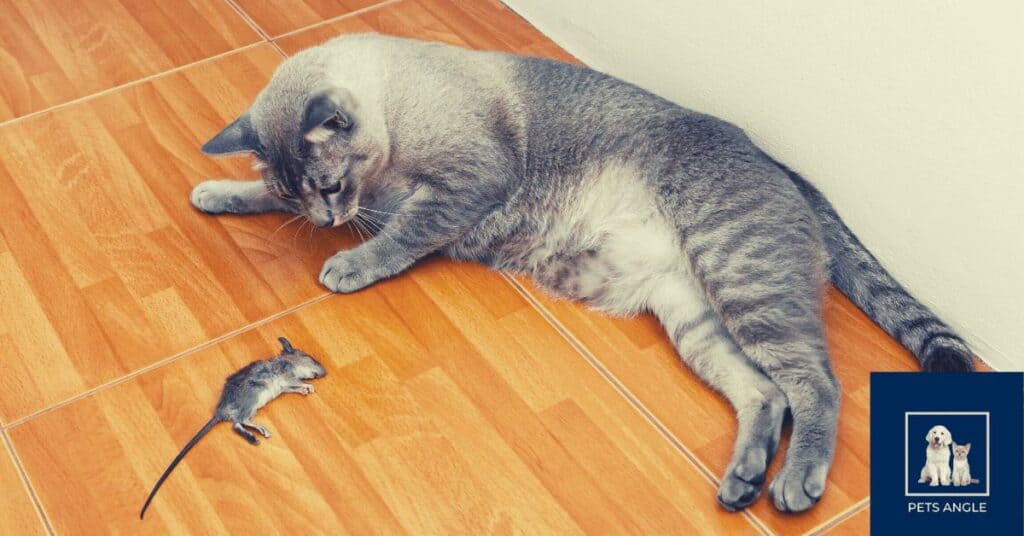Cats kill rats for a variety of reasons.
Cats switch to playful mode at the sight of rats within their territory. Cats’ desire to hunt rats has nothing to do with hunger because cats hunt for fun instinctively.
Do Cats Kill or Eat Rats?
Cats are excellent hunters and small rodent killers, but they rarely consume the prey they kill. Your cat’s chances of catching a mouse are substantially better than consuming its prey.
Feral cats occasionally consume mice, small birds, and frogs, but this is not widespread.
Why Do Cats Eat Rats?
When cats are hungry, they are more inclined to devour rats. Cats are obligate carnivores, meaning they can only eat meat.
Cats with voracious appetites may supplement their daily diet by catching the occasional prey.
Why is a Rat Afraid of a Cat?
According to new research, cats, rats, and other predators emit a chemical signal that terrifies mice. Mice react dread when detecting specific proteins in cat saliva and rat urine.
Are Rats Toxic to Cats?
As much as we see hunting of rodents as the usual routine for cats, eating rats and mice can be harmful to our pets in rare situations.
Cats can get poisoned by eating rodenticides left on the ground or by eating rodents that have eaten rodenticides.
Intestinal worms, toxoplasmosis infection, and the chance of secondary rat bait poisoning are other risks.
Cats can contract hantavirus, toxoplasmosis, or canicola fever from rodents. Humans can also get infected with these diseases.
What Should I Do If My Cat Consumes Rats?
If you think your cat ate a mouse, keep an eye out for signs of vomiting, diarrhea, or gastrointestinal pain during 24-48 hours. Cats are expert hunters, and they consume their prey to stay alive in the wild.
A cat’s physiology can process meat and bones, and consuming a mouse often has no adverse consequences.
Why Do Cats Bring Dead Animals to Their Owners?
They are frequently unable to resist the thrill of the chase and will pursue their victim with zeal.
The most basic reason cats bring dead animals to you is that they treat you like family, present the catch to you, and teach you to do the same.
How Long Does It Take a House Cat to Kill a Rat?
When it comes to little rodents, most house cats are not in a hurry to kill them.
It can take hours for some house cats to kill a small creature if they kill it. They do it for fun and hone their hunting skills, letting the mouse, rat, or chipmunk escape so they can catch it repeatedly.
They may harm it and then walk away, bored.
Barn cats and other feral cats are known for making rapid murders because they require animal protein to survive and also need to conserve their energy resources. They can kill you in a matter of seconds.
House cats are well fed by their owners and generally do not need rodents. Hence, they tend to harass small mammals for extended periods.
Is it True that Mice and Other Vermin will Avoid Houses with Cats?
Cats help deal with the rodent population, but cats’ presence does not ensure the total elimination of rats.
Rodents are primarily interested in easy access to food, shelter, and fluids. Therefore, a decent mouse trap can help curtail the menace of mice.
Trapping the rodents may still not solve the problem, as the rats can quickly reproduce. Access denial away from the areas of interest remains the best option.
The exclusion measure contains the restrictions that prevent entry to your subarea. A rat can enter your home through a hole. Because of its cartilage, a gigantic rat can fit through a quarter-sized hole.
It’s a team effort, with the cats hunting at times and you figuring out where the rats, mice, and vermin are coming from, sealing up all edibles in glass, metal, or plastic containers so the mice or insects can’t get to them, and putting more traps.
As a result, while hunting cats can assist in lowering vermin populations, they can’t eliminate them.

